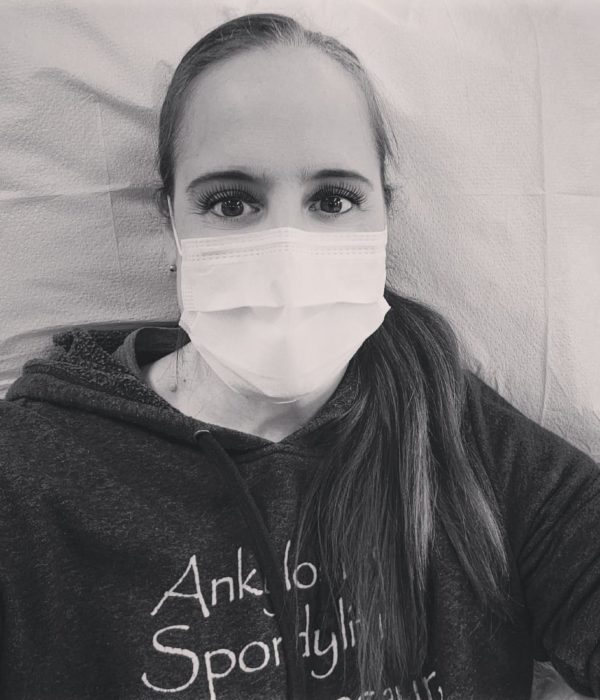Learn more about our FREE COVID-19 Patient Support Program for chronic illness patients and their loved ones.
Gina Catalano is a 40-year-old living with ankylosing spondylitis in Columbus, Ohio. She was diagnosed with this form of inflammatory arthritis in 2015 but has been experiencing symptoms since 2009. This is adapted, with permission, from a message she recently shared on her personal Facebook page.
Two weeks. Two agonizing weeks during which I weighed the pros and cons of receiving my monthly Remicade infusion amidst the coronavirus pandemic.
I receive these monthly biologic infusions to help slow down the progression of ankylosing spondylitis (AS), a type of degenerative inflammatory arthritis that causes pain and stiffness in my back, hips, and knees. AS is also considered systemic, which means that the disease can affect other parts of the body including the heart, lungs, and eyes.
A biologic medication like Remicade is intended to reduce inflammation, treat symptoms, and prevent long-term damage from my condition. It is also considered immunosuppressing because it works on immune system pathways to curtail the inflammation that occurs in AS. This can make patients like me more vulnerable to different kinds of infection.
After all was said and done, I ultimately decided to go ahead with the infusion. I called ahead to see what precautions had been implemented in order to protect both patients and staff members from COVID-19.
I felt reassured.
I took my mandatory 50 mg of Benadryl (which helps prevent reactions to the infusion when taken beforehand) and hastily applied a coat of mascara.
I hadn’t wandered more than a few blocks from my house in four weeks — the occasion called for a gesture slightly more elegant than a ponytail and yoga pants.
As I walked into the building, I was greeted by a nurse in full head to toe PPE (personal protective equipment). She immediately scanned my forehead with a temporal thermometer. After several attempts, she finally appeared convinced that my temperature was indeed normal.
I was given a Post-It that confirmed my temperature (97.7 degrees F), a surgical mask, and two pairs of nitrile medical gloves. I was then escorted upstairs.
The infusion suite, a large communal area normally separated from the waiting room by a short hallway and wooden door, had been utterly transformed. The waiting room and hallway had become an extension of the suite itself, with the infusion chairs the requisite 6 feet apart from one another.
I was handed off to my infusion nurse who verified, once again, that I was fever-free. As the nurse prepped my vein for the IV, I realized just how grateful I was.
Grateful for a treatment that genuinely keeps my body running.
Grateful for a nursing staff who showed up to work, putting their own safety on the line, in order to make sure I received my infusion.
And grateful that I had thought to put on mascara before leaving the house.
#HighRiskCovid19 #NotAllHeroesWearCapes
Get Free Coronavirus Support for Chronic Illness Patients
Join the Global Healthy Living Foundation’s free COVID-19 Support Program for chronic illness patients and their families. We will be providing updated information, community support, and other resources tailored specifically to your health and safety. Join now.






